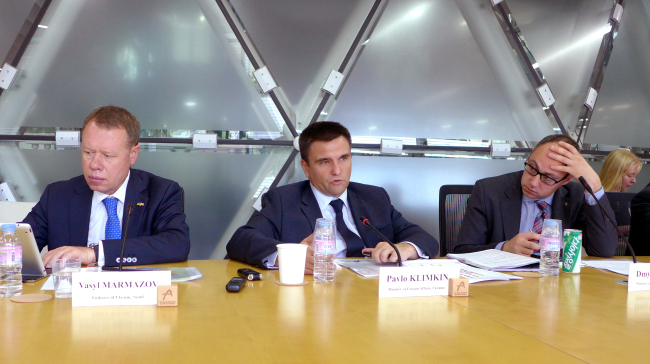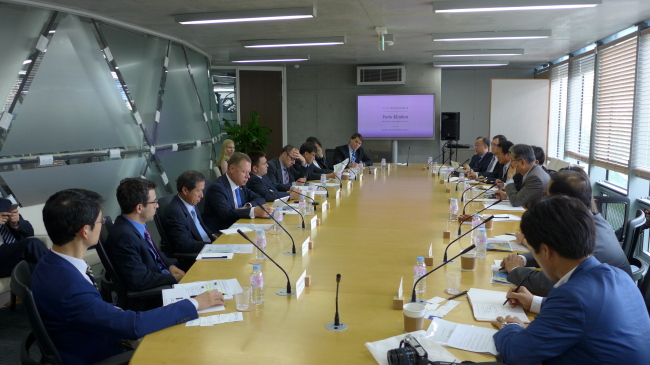Ukraine’s efforts to create a united, democratic and European order will hinge on the successful implementation of the Minsk Agreement, as diplomats of Ukraine, Russia, Germany and France are striving to end conflict in war-torn Donbass in eastern Ukraine, the country’s Foreign Minister Pavlo Klimkin said Friday.
Klimkin stressed that the real challenge is to establish and sustain a lasting structure based on universal values and economic rules, amid Ukraine’s struggle to break free from Russian influence.
 |
(From left) Ukrainian Ambassador Vasyl Marmazov, Ukrainian Foreign Minister Pavlo Klimkin and Ukrainian diplomat Dmytro Senik. Joel Lee / The Korea Herald |
“Events surrounding the Euromaidan movement of late 2013 were groundbreaking for Ukraine, in terms of our post-Soviet mentality, institutional reform and historic legacy,” Klimkin told scholars, policymakers and journalists at the Asan Institute for Policy Studies. “That Ukraine should stay united, democratic and be part of the European Union is an unnegotiable position.”
Klimkin visited Korea last week to elicit cooperation in diplomacy, trade and investment and people ties, and met his Korean counterpart Yun Byung-se.
Representatives of Ukraine, Russia and the self-proclaimed Donetsk People’s Republic and Lugansk People’s Republic signed the Minsk Agreement on Sept. 5 last year to halt the war in Donbass under the auspices of the Organization for Security and Cooperation in Europe.
Violence has receded in the area, although periodic fighting has continued. Ukrainian President Petro Poroshenko recently expressed optimism for the deal to be fulfilled by the year’s end, also indicating concerns over the OSCE Special Monitoring Mission’s limited access to the Ukraine-Russia border.
The agreement consists of 12 points, including immediate cease-fire and its monitoring by the OSCE; granting local self-governance to certain districts of Donetsk and Luhansk oblasts; release of hostages; prevention of prosecution of people; continuing dialogue; improving humanitarian assistance; ensuring early local elections in accordance with the Ukrainian law; withdrawing rebels and weapons; and economic reconstruction.
 |
Scholars, policymakers and journalists engage in a roundtable discussion on the Ukrainian crisis at the Asan Institute for Policy Studies. Joel Lee / The Korea Herald |
“The agreement is about deescalating the conflict, stabilizing the area and renewing destroyed infrastructure and lives,” the minister stressed. “The simple way is to stop shelling and sending weaponries to Donetsk, currently overtaken by Russian regular and special forces.”
Regarding Russia’s annexation of Crimea and alleged military intervention in Donbass, Klimkin said that Ukraine was militarily and politically unprepared to defend its territory. He added that delivering humanitarian assistance to people on the ground was urgent, as more than 1.4 million have been internally displaced.
The diplomat also underscored having a “fair” and “legitimate” election under the OSCE supervision.
According to the European Council on Foreign Relations, the attempt by the leaders of DPR and LPR to hold separate local elections on Oct. 18 and Nov. 1, respectively, paralleling those organized by the Ukrainian authorities, would constitute a breach of the Minsk agreement and undermine its peacebuilding process.
It cited concerns that the separate election would not comply with OSCE standards or monitoring requirements. Diplomatic efforts are underway to find a solution to hold the elections on a joint legal basis.
Klimkin claimed that Russia broke its commitment to the Budapest Memorandum on Security Assurances of 1994, where the three nuclear powers of Russia, the U.S. and the U.K. signed to provide security assurances to Ukraine for its accession to the Treaty on the Non-Proliferation of Nuclear Weapons. As part of the deal, Ukraine gave up a sizable nuclear weapons stockpile between 1994 and 1996, the world’s third largest at the time.
Noting the massive influx of refugees from the Middle East to Europe, Klimkin emphasized that the EU should deal with the Ukrainian crisis more effectively to safeguard its solidarity, stability and trust in line with the world’s new realities.
According to professor Hong So-gu of Hanguk University of Foreign Studies’ Ukrainian Department, the Korean government has maintained a “neutral” position on Ukraine relative to the U.S. and EU.
Seoul has declared that Ukraine’s sovereignty, territorial integrity and independence must be respected in line with the Minsk agreement, and has provided $1.5 million humanitarian aid through international organizations and 100,000 euros through the OSCE.
Kiev, as one of few Commonwealth of Independent States countries, has supported Seoul in condemning Pyongyang’s third nuclear test in 2013 and sinking of Corvette Cheonan in 2010.
Bilateral trade and investment were hit hard by the Ukrainian crisis and 2008 global financial crisis, with the two-way trade declining to $1.1 billion last year since 2008.
Ukraine with 45 million people has a territory 3.5 times the size of the Korean peninsula. There are potentials for increased cooperation in agriculture, energy, construction, IT and infrastructure, according to Korea’s Ministry of Foreign Affairs.
By Joel Lee (
joel@heraldcorp.com)









